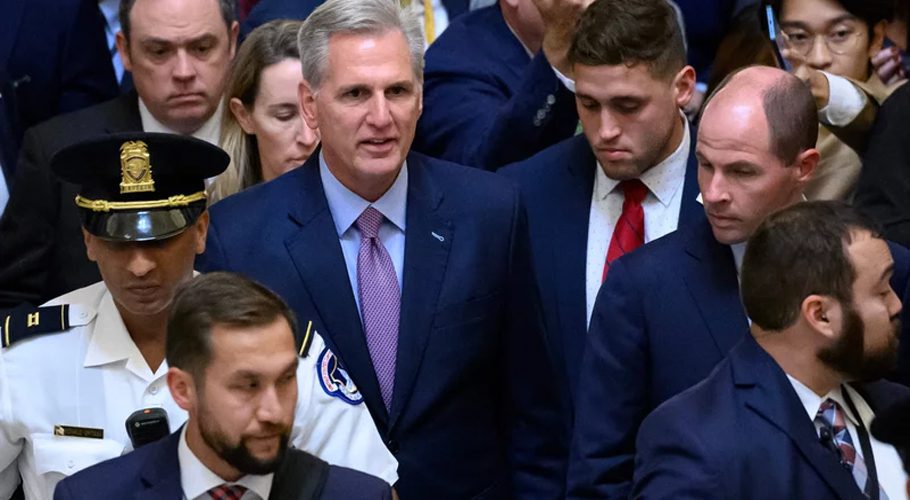Republican Kevin McCarthy on Tuesday made history by becoming the first speaker to be ousted when a few very conservative rebels teamed up with Democrats to assume the gavel.
After being demoted from his leadership post, McCarthy stated that he would not seek re-election to the House’s top position. He also recognized that negotiating with Democrats to prevent a government shutdown had made him a target.
“I don’t regret standing up for choosing government over grievance,” he said. “It is my responsibility. It is my job.”
In many ways McCarthy’s sudden ouster was foreshadowed in January, where a razor-thin GOP majority took five days and 15 rounds of votes for the California Republican to become speaker.
McCarthy was able to claw to the speaker’s seat by herding right-wing critics back into his camp after making several behind-the-scenes concessions, including the rule that allowed a single member to call for a vote ousting the speaker.
Here are five takeaways from the tumultuous event:
New temporary speaker: Patrick McHenry
The House has entered uncharted territory as the removal of a speaker for the first time in history.
McCarthy would have been compelled by House rules to compile a list of names for the clerk of fellow members in the event of his resignation. According to Rule I, clause 8, whomever McCarthy put next on that list “shall act as Speaker pro tempore until the election of a Speaker or a Speaker pro tempore”.
Patrick McHenry, a Republican from North Carolina, has since taken over as House speaker pro tempore, or “for the time being.” McHenry, who chairs the financial services committee, voted against McCarthy’s dismissal.
Also read: Kevin McCarthy’s wild ride as US House speaker ends in historic fall
Given McCarthy’s chaotic 15-ballot election in January, it seems all but certain that another multiple ballot election will ensue.
This may open the door for Steve Scalise
McCarthy’s likely replacement, Representative Steve Scalise of Louisiana, has been named as the No. 2 House Republican at the moment. On Monday, Gaetz specifically mentioned McCarthy’s longtime foe in a conversation with reporters.
Gaetz declared, “I am not going to overlook Steve Scalise just because he has blood cancer.”
Announcing his diagnosis in August, Scalise, who is presently undergoing chemotherapy for blood cancer, noted that the disease was “very treatable” and that it had been discovered early.
We’ll likely continue to see a galvanized Gaetz
Gaetz, who had been critical of McCarthy long before the latter took the speakership, lambasted the disgraced politician shortly after his ousting as “a creature of the swamp”.
“He has risen to power by collecting special interest money and redistributing that money in exchange for favors,” Gaetz said on Tuesday during an interview on CNN. “We are breaking the fever and we should elect a speaker who is better.”
Gaetz doubled down on his vote of confidence for Scalise, telling the network in response to a question of whether he would now nominate Scalise: “I think the world of Steve Scalise. I think he would make a phenomenal speaker.”
Given that Gaetz used the vote to boot McCarthy as a means to fundraise for himself, he is expected to make more trouble for the House in the coming weeks.
Republicans are in full-fledged ‘chaos’
No one likes to live in unprecedented times, but – yet again – here we are. Eight Republicans voting in favor of removing McCarthy illuminates the burgeoning fissures amid the GOP. Those eight included representatives Andy Biggs of Arizona, Ken Buck of Colorado, Tim Burchett of Tennessee, Eli Crane of Arizona, Bob Good of Virginia, Nancy Mace of South Carolina, Matt Rosendale of Montana, and Gaetz.
The former Republican vice-president Mike Pence, speaking at an event at Georgetown University in Washington, DC, said: “Chaos is never America’s strength and it’s never a friend of American families that are struggling. I’m deeply disappointed that a handful of Republicans have partnered with Democrats to oust Kevin McCarthy as speaker of the House.”
































